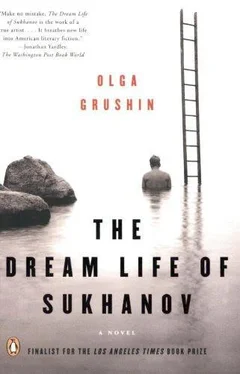“What is the meaning of this?” Sukhanov said in a measured voice.
Startled, the editors looked up from their pads, and a hush fell among them.
“Anatoly Pavlovich,” said Ovseev, hurriedly rising from Sukhanov’s chair.
“Why are you all here?”
“Anatoly Pavlovich, we had to call an urgent meeting to discuss a few last-minute changes to the current issue—and since you were supposed to be out of town—”
Lisitskaya’s heels pattered across the floor as she darted to hide behind Ovseev.
Sukhanov marched to his desk, regained possession of his chair, and opened his briefcase with a harsh snap, all his gestures meant to reassert his momentarily lapsed command.
“What nonsense, I wasn’t out of town,” he said curtly. “How could I be, with that Dalí article on my hands? Speaking of which, someone should take it to the printers right away.”
“But,” said Ovseev, “surely you know…” He did not finish the sentence.
“I have it right here, hold on just one… What did you say?” Out of the corner of his eye, he noticed a few people gingerly tiptoeing out of the office, while Pugovichkin drew closer and hovered above him. Looking up, Sukhanov found an exaggerated concern wrinkling the man’s kindly pancake of a face.
“Anatoly Pavlovich, I don’t believe it!” moaned the assistant editor in chief. “Could it be you haven’t heard?”
Sukhanov stared at him blankly.
“I’m afraid,” Pugovichkin said, spreading his plump hands outward in a gesture of futility, “the Dali piece has been postponed.”
“We hope it didn’t give you too much trouble,” Ovseev added with an ingratiating smile. “Of course, it will be published soon, if not in the next issue, then in the one after that for sure—”
“And how, I’d like to know, could this decision be made without me?” Sukhanov thundered incredulously. “How can any of this be happening without me?”
Lisitskaya’s heels fled into the corridor with the sound of a frantic drumroll.
“Well, you see,” said Pugovichkin quickly, “we received this phone call the day before yesterday.” He raised his eyes meaningfully to the ceiling, to indicate a far-off, heavenly sphere of influence—their accepted shorthand for communications from the magazine’s Party liaison. “It appeared that a more… more timely subject had come to someone’s attention, and we were to be sent a new article that very afternoon. On Chagall. We were told that, in view of his recent death… You know, of course, he died this past March…. And since you were leaving…”
“Chagall,” Sukhanov repeated, his voice ominously steady. “They want Art of the World to publish an article on Chagall, and you have actually agreed to it? Be so kind as to tell me I’ve misheard you, Sergei Nikolaevich. Or have you lost your mind?”
The few remaining people slunk outside, and Sukhanov was left alone with his second-in-command. Pugovichkin was talking now, in a rapid, offended monotone, gathering momentum, trying to convince him of something, but for a few minutes Sukhanov heard nothing as he sat staring at the dust particles twirling before him in the stuffy, sun-lacerated air. True, he had allowed the questionable Dali article to be forced upon the magazine, grudgingly resigning himself to this one-time challenge to his authority—but a piece on Chagall would take matters to an entirely new level. The difference between Dali, outrageous by virtue of his foreign birth and viewed therefore as a mere curiosity akin to a two-headed goat in some little-frequented Kunstkammer, and Chagall, who had come from Russia’s own backyard, been appointed Commissar of Fine Arts after the Revolution, taught in a Soviet art academy, and then chosen to leave Russia behind in order to become foreign and outrageous, was just as wide and impassable as the difference between some poor jungle savage who knows nothing beyond the cruel and nonsensical superstitions of his tribe and a man of civilized faith who proceeds to give it up in order to murmur incantations and slaughter chickens. Publishing an article on Chagall would be universally interpreted as an act of rebellion, an absolute break with decades of steadfast traditions of Soviet criticism, which he himself had helped to invent, and as likely as not would prove tantamount to career suicide for him and his senior staff.
Publishing such an article was impossible.
“It will be most welcome, I was assured,” Pugovichkin was saying, trotting back and forth across the office. “In fact, I’ve been told that the Ministry is thinking of organizing a Chagall retrospective in a year or two. Wouldn’t that be something?”
Sukhanov lifted his head. He was no longer angry, only tired, very tired.
“Don’t be so naive, Serezha,” he said quietly. “You sound just like an excitable eighteen-year-old girl I met the other day. Changes, changes, spring in the air, Soviet art is inferior, let’s all say what we think! At least she has the excuse of being young—but you and I, we should know better, we went through it all once before, didn’t we? Honestly, can you not see that this whole Chagall business is nothing but a provocation, a test of loyalty, if you will? The Ministry has no intention of putting on any ‘retrospective.’ It simply hopes to flush out the handful of enthusiastic fools who will believe in all their fine promises and start getting carried away, saying unwise things and publishing unwise articles—and before one has time to blink, they’ll have lost their jobs and been sent off to the provinces, or worse, and new people in their places will say and write the same old things as before.”
Pugovichkin stopped pacing and leaned over the desk.
“I understand your worries,” he said earnestly, “but I think you underestimate the nature of what is happening in the country this time around. Look, Tolya, it’s been less than six months since the leadership change in March, and already, the man has said some pretty radical things. His Leningrad speech, with its barbs at the old guard—”
Sukhanov waved his hand to cut him off. “You don’t know what will happen any more than I do,” he said, “but my prediction is, absolutely nothing. It’s all smoke and no fire. Chagall, imagine that! Who’s next, Trotsky? By the way, who’s the author?”
“Someone with a very Russian name, like Petrov or Vasiliev… I’ll remember in a moment. No one we’ve ever heard of, a curator from somewhere or other—but clearly with friends in high places. If nothing else, it may not be prudent to get them upset.”
“Well, I suppose,” said Sukhanov, frowning, “if written from a certain critical perspective, it might—with some heavy editing, of course—”
“It’s already at the printers,” muttered Pugovichkin, averting his eyes.
Sukhanov looked at his right-hand man across a sudden gap of silence, palpable and unpleasant like an acrid taste in his mouth.
When Pugovichkin spoke, his voice was almost hostile with defensiveness. “Well, what would you have done in my place? I was put on the spot. I was told in no uncertain terms to publish the damn piece. Think about it, the issue must be typeset by Monday, and you were going away, as far as we knew. What was I supposed to—”
“Just why does everyone think I was going away?” Sukhanov interrupted heatedly.
“Must we now belabor the obvious? I called you as soon as I heard, on Tuesday morning, and you weren’t there, but—”
“Tuesday, you say? I was home most of the day.”
“No, you weren’t. I spoke to Vasily, and he told me you were out. I left a detailed message with him, explaining the situation. He said he was about to go to the Crimea with you.”
Читать дальше








![Theresa Cheung - The Dream Dictionary from A to Z [Revised edition] - The Ultimate A–Z to Interpret the Secrets of Your Dreams](/books/692092/theresa-cheung-the-dream-dictionary-from-a-to-z-r-thumb.webp)



